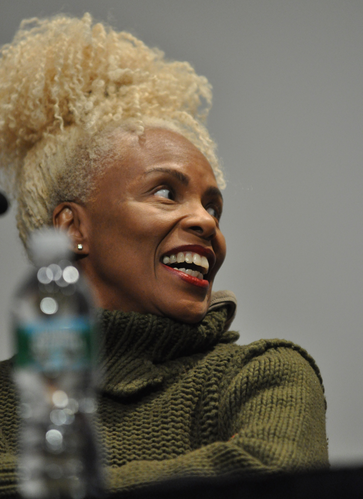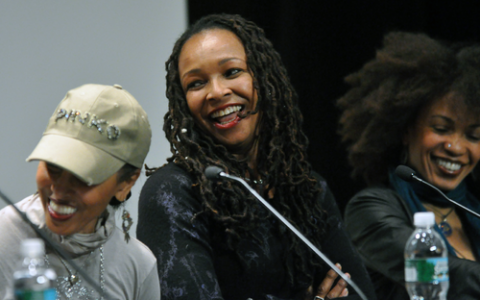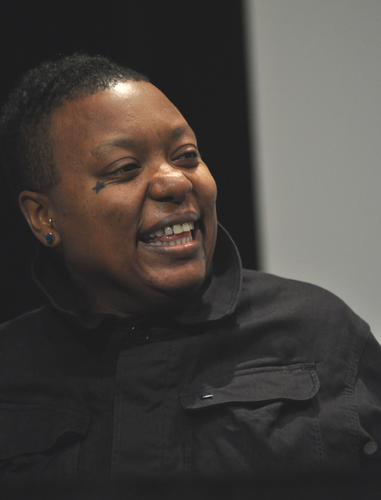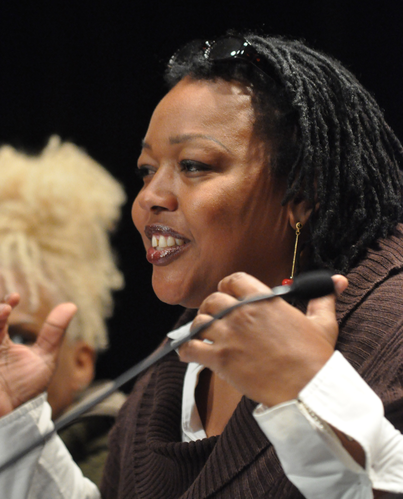Women Rock and Talk

Joyce Kennedy
Photo by Phil Farnsworth

Nona Hendryx, Siedah Garrett, and Cindy Blackman
Photo by Phil Farnsworth

Meshell Ndegeocello
Photo by Phil Farnsworth

Kudisan Kai
Photo by Phil Farnsworth
Twenty minutes late. High-heeled boots, black leather coats, and shades. The women were so cool you could practically feel the temperature drop. No doubt about it: These performers—at Berklee for a three-day Women in Rock series of events—knew how to make an entrance, even when all they were coming to do was talk.
On October 8, five pioneering African-American women artists shared their hard-won wisdom, encouraging the multiethnic and by-no-means-all-female audience at the David Friend Recital Hall to break away from expectations.
Berklee professor/rock vocalist Kudisan Kai moderated the discussion among alumna drummer Cindy Blackman '80, who is well-known for playing with Lenny Kravitz; Siedah Garrett, who cowrote Michael Jackson's hit "Man in the Mirror"; Nona Hendryx, who busted out in glitter as a glam rocker with LaBelle in the '70s; Joyce Kennedy, who coheaded the funk-rock group Mother's Finest in the same era; and bassist Meshell Ndegeocello.
On the roots of rock 'n' roll
Cindy Blackman: "I've seen people say [to Lenny Kravitz]... 'Why are you playing this music? It's not black music. This is not what you're supposed to be doing.'.... It's not true at all. It's definitely black music, because that's where it comes from."
Siedah Garrett: "Rock 'n' roll is just blues up-tempo... ask Little Richard!"
Meshell Ndegeocello: "I don't ever feel confined musically. I always do what I want to do. I live in a synagogue built on an ashram in Harlem on Martin Luther King Avenue. All the things exist together for me.... I'm just a kid who was teased, and I learned to play music, and it's fun. And I leave all of that other stuff to other people."
On discrimination
Joyce Kennedy: "[A Chicago DJ] had been playing the hell out of the album, [which had] no pictures, so he had no idea whether we were black or whatever. He just assumed from the music and the sound of the music, the way it was produced... that it was a normal Anglo-Saxon type of people playing the music. So he played the hell out of it before we got there. Do I have to tell you what happened after? No more airplay."
Nona Hendryx: "You couldn't stay in certain hotels. You had to stay in rooming houses, primarily, in what was called the ghetto at that time. [There were] restaurants where we were actually asked to leave the restaurant at gunpoint because we weren't supposed to be in that restaurant.... We were invited to perform at certain colleges but we weren't allowed to stay on the campus. People threw stuff at us at times. And Patti [LaBelle] recently recounted to me that when she was first introduced to the head of the label for our first recording he said she was too ugly and too black to sing."
On reaching fans
Kennedy: "There's been times at our concerts, you can have somebody that on an everyday level wouldn't associate with anybody who was black, and then at our concert he'd be standing next to a brother going [raises fist] YEAHHH.... Rock 'n' roll, music has always been a bridge to people coming together."
On music education
Ndegeocello: "The learning comes from the thing that's uncomfortable. Stuff you love? You can do that with your friends. But take advantage of the [classes] where you're like 'gonna be boring, but I might pick up something that just changes my whole vibe.' And then you add that to the lump of clay that is yourself."
Blackman: "When I went to New York, I wanted to play with Miles Davis.... and one day out of the blue I get a phone call... from Lenny Kravitz. And if I didn't have any kind of repertoire—because we talked that day, I played some over the phone, he asked me to fly out the next morning, which I did, so there was no time to do any studying. So if I didn't have a repertoire base, by the time I got out there to play with that person, I wouldn't have been able to do it. And that was a gig that went on for 15 years."
On the rock 'n' roll lifestyle
Kennedy: "I have two cats: one named AC and the other named DC."
On bridging genres
Garrett: "It was very hard for any A&R guy to try and market me because I'm a pop singer, pop songwriter, I write r&b songs.... If you aren't clearly labeled, they don't know what to do with you.... That is the issue I've had my entire career as a solo artist, which is why I started writing songs, singing jingles—I'm right now the voice of Toyota for Southern California."
Ndegeocello: "I'm a musician and I play all music. I'm not a rock musician, I'm not a black musician. I'm a bass player."
